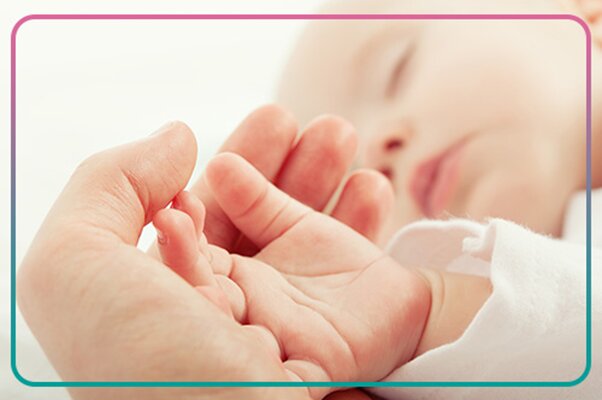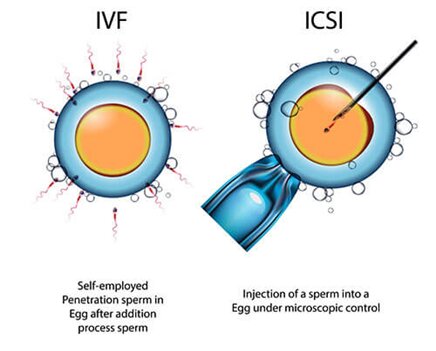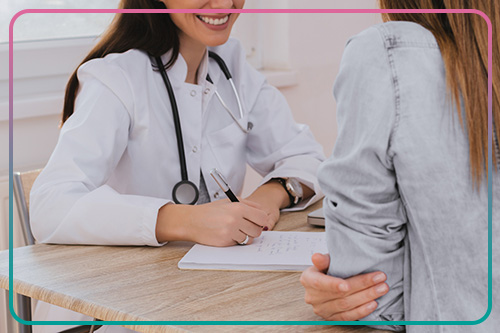Hayat MedTour is a medical tourism facilitator in Iran that has specialized in providing fertility assistance, infertility treatment and IVF in Iran at the best quality and affordable prices
Wednesday, April 27, 2022
HayatMedTour | Fertility Treatment in Iran | IVF in Iran
Sunday, February 6, 2022
Infertility Treatment Methods
Infertility Treatment Methods (IVF | ICSI | EGG
Donation)

Tehran (ISNA) - Normal pregnancy depends on various factors and conditions, in case of any disorder in any of them, the chance of fertility is decreased or even may go to zero. Infertility is one of the unwanted life phenomena that have been recently increased. A couple who couldn’t have a baby after a year of having sex without contraception, they are considered as infertile. All things needed couples know about fertility treatment is described in this post.
Infertility and its affecting factors
A couple is considered infertile if they cannot become pregnant after 12 months of unprotected intercourse. For women over the age of 35, infertility means not having fertility after 6 months of unprotected sex. Various causes can lead to infertility in couples. In general, these factors can be summarized in female and male factors.
Female-infertility factors include abnormalities in the female reproductive system or poor egg quality that impairs fertility.
Male-Infertility Cause is one-third of couples’ infertility causes. These types of infertility indicate the presence of dysfunction in sperm production or ejaculation in the male.
Research shows that in a third of cases, a combination of female and male factors causes infertility in couples. About 10% of couples also suffer from unknown causes of infertility.
Different methods of fertility treatment
There are different methods of infertility treatment like IVF, ICSI, IUI, and Egg Donation which can help infertile couples and give them a chance to have a baby. Iran is one of the leading countries in the region and in the world in the field of infertility treatment, therefore many couples choose fertility treatment in Iran for infertility treatment.
Several advanced research institutes and hospitals, provide infertility treatment services like IVF in Iran to both local and international patients. Moreover, other fertility services such as Gender Selection are offered in these centers as well for people who choose fertility treatment in Iran.
In the following, some of the most important methods of infertility treatment are introduced.
What is IVF?
In Vitro Fertilization (IVF) is one of the assisted reproductive techniques (ART) in which a man’s sperm and the woman’s egg are combined in a laboratory dish, where fertilization occurs. When the egg is fertilized, the primary cell begins to divide and form the embryo. The resulting embryo or embryos is/are then transferred to the woman’s uterus to implant and develop naturally.
How is IVF done?
IVF is a common procedure, used to overcome a range of fertility issues. It is a multi-step process involving ovulation induction, egg retrieval, Collection and preparation of sperm, fertilization, culture, and embryo transfer. The IVF process can be explained in these five steps:
• Ovulation induction
The greater the number of oocytes prepared during a treatment cycle, the greater the chance of a healthy fetus forming and subsequently the chance of pregnancy. A doctor prescribes ovulation induction drugs to stimulate the growth of several oocytes in a woman’s cycle.

• Ovum Pick up:
During a minor surgery, the infertile doctor picks up the mature oocytes using a special needle. This is done under conditions of local or general anesthesia. The procedure usually takes less than 30 minutes.
• Collection and preparation of sperm
In vitro fertilization of the oocyte with sperm requires the collection of semen. If the male is unable to produce semen, TESE or PESA methods are used to collect sperm.
The collected sperms are washed by a specific method and examined for motility and shape. Finally, high-quality sperms are selected to fertilize the oocytes.
• Fertilization and embryo culture:
After the ovum picks up, the embryologist examines the obtained egg to select mature eggs that are suitable for fertilization.
The mature eggs are placed in a culture medium and the sperm is transferred to an incubator for fertilization. In IVF, high-motility sperms move to the eggs and fertilize them. Once this occurs, the fertilized eggs are considered embryos.
In conditions with a low number and low quality of sperm, the specialist uses intracytoplasmic sperm injection (ICSI). It is an additional part of an IVF treatment cycle in which a single sperm is injected into each egg to assist fertilization.
• Embryo Transfer
Finally, the selected embryos are prepared for transfer to the uterus. A specialist physician inserts the embryo into the mother’s uterus during a minor surgery without the need for anesthesia.
What is the difference between ICSI and IVF?
The difference between IVF and ICSI is in how the oocyte is fertilized. In IVF, the oocyte is exposed to sperm in an in -vitro container until the highly motile sperm enters the oocyte and fertilizes it. But in the ICSI technique, a selected sperm is injected directly into the oocyte through a special needle. In this method, high-quality and motile sperm are separated and ready for injection in a laboratory using a special method. The ICSI method is mostly used in cases where the quality of male sperm is low.

Egg donation
Infertility is not always cured by prescribing medication or using advanced methods of infertility treatment. In cases where a woman’s ovarian reserves are low or the quality of eggs is low, but the uterus and other reproductive organs are healthy, the only fertility way is to receive an egg donated by a volunteer. For a consult of our doctors and specialists and to use the service of Egg Donation in Iran, you can contact us through the HayatMedTour website.
Fertility treatment in Iran
With over 30 years of experience in infertility research and treatment, Iran is one of the world’s pioneers in effective infertility treatment. There are more than 80 specialized fertility treatment centers in Tehran, Urmia, Yazd, Isfahan, and other cities of Iran. These clinics with the up-date of knowledge and equipment in the world; offer various methods for infertility treatments with the best quality and reasonable prices.
The high quality and affordable cost of fertility treatments in Iran have led many medical tourists to choose this destination for the treatment of their infertility problems.
End Item
Friday, November 5, 2021
Male fertility testing
Diagnostic Tests for Male Infertility
Many infertile couples have more than one cause of infertility, so it's likely you will both need to see a doctor. It might take a number of tests to determine the cause of infertility. In some cases, a cause is never identified.
Infertility tests can be expensive and might not be covered by insurance — find out what your medical plan covers ahead of time.
Diagnosing male infertility problems usually involves:
- General physical examination and medical history. This includes examining your genitals and asking questions about any inherited conditions, chronic health problems, illnesses, injuries, or surgeries that could affect fertility. Your doctor might also ask about your sexual habits and about your sexual development during puberty.
- Semen analysis. Semen samples can be obtained in a couple of different ways. You can provide a sample by masturbating and ejaculating into a special container at the doctor's office. Because of religious or cultural beliefs, some men prefer an alternative method of semen collection. In such cases, semen can be collected by using a special condom during intercourse.
Your semen is then sent to a laboratory to measure the number of sperm present and look for any abnormalities in the shape (morphology) and movement (motility) of the sperm. The lab will also check your semen for signs of problems such as infections.
Often sperm counts fluctuate significantly from one specimen to the next. In most cases, several semen analysis tests are done over a period of time to ensure accurate results. If your sperm analysis is normal, your doctor will likely recommend thorough testing of your female partner before conducting any more male infertility tests.
Your doctor might recommend additional tests to help identify the cause of your infertility. These can include:
- Scrotal ultrasound. This test uses high-frequency sound waves to produce images inside your body. A scrotal ultrasound can help your doctor see if there is a varicocele or other problems in the testicles and supporting structures.
- Transrectal ultrasound. A small, lubricated wand is inserted into your rectum. It allows your doctor to check your prostate and look for blockages of the tubes that carry semen.
- Hormone testing. Hormones produced by the pituitary gland, hypothalamus, and testicles play a key role in sexual development and sperm production. Abnormalities in other hormonal or organ systems might also contribute to infertility. A blood test measures the level of testosterone and other hormones.
- Post-ejaculation urinalysis. Sperm in your urine can indicate your sperm are traveling backward into the bladder instead of out your penis during ejaculation (retrograde ejaculation).
- Genetic tests. When sperm concentration is extremely low, there could be a genetic cause. A blood test can reveal whether there are subtle changes in the Y chromosome — signs of a genetic abnormality. Genetic testing might be ordered to diagnose various congenital or inherited syndromes.
- Testicular biopsy. This test involves removing samples from the testicle with a needle. If the results of the testicular biopsy show that sperm production is normal your problem is likely caused by a blockage or another problem with sperm transport.
- Specialized sperm function tests. A number of tests can be used to check how well your sperm survive after ejaculation, how well they can penetrate an egg, and whether there's any problem attaching to the egg. These tests aren't often used and usually don't significantly change recommendations for treatment.
Monday, October 25, 2021
Fertility Treatment
There are 3 main types of fertility treatment:
- medicines
- surgical procedures
- assisted conception – including intrauterine insemination (IUI) and in vitro fertilizations (IVF)
Medicines
Common fertility medicines include:
- clomiphene – encourages the monthly release of an egg (ovulation) in women who do not ovulate regularly or cannot ovulate at all
- tamoxifen – an alternative to clomiphene that may be offered if you have ovulation problems
- metformin – is particularly beneficial for women who have polycystic ovary syndrome (PCOS)
- gonadotrophins – can help stimulate ovulation in women, and may also improve fertility in men
- gonadotrophin-releasing hormone and dopamine agonists – other types of medicine prescribed to encourage ovulation in women
Some of these medicines may cause side effects, such as nausea, vomiting, headaches and hot flushes.
Speak to your doctor for more information about the possible side effects of specific medicines.
Medicine that stimulates the ovaries is not recommended for women with unexplained infertility because it has not been found to increase their chances of getting pregnant.
Surgical procedures
There are several types of surgical procedures that may be used to investigate fertility problems and help with fertility.
Fallopian tube surgery
If your fallopian tubes have become blocked or scarred, you may need surgery to repair them.
Surgery can be used to break up the scar tissue in your fallopian tubes, making it easier for eggs to pass through them.
The success of surgery will depend on the extent of the damage to your fallopian tubes.
Possible complications from tubal surgery include an ectopic pregnancy, which is when the fertilised egg implants outside the womb.
Endometriosis, fibroids and PCOS
Endometriosis is when parts of the womb lining start growing outside the womb.
Laparoscopic surgery is often used to treat endometriosis by destroying or removing fluid-filled sacs called cysts.
It may also be used to remove submucosal fibroids, which are small growths in the womb.
If you have polycystic ovary syndrome (PCOS), a minor surgical procedure called laparoscopic ovarian drilling can be used if ovulation medicine has not worked.
This involves using either heat or a laser to destroy part of the ovary.
Read more about laparoscopy.
Correcting an epidydimal blockage and surgery to retrieve sperm
The epididymis is a coil-like structure in the testicles that helps store and transport sperm.
Sometimes the epididymis becomes blocked, preventing sperm from being ejaculated normally. If this is causing infertility, surgery can be used to correct the blockage.
Surgical extraction of sperm may be an option if you:
- have an obstruction that prevents the release of sperm
- were born without the tube that drains the sperm from the testicle (vas deferens)
- have had a vasectomy or a failed vasectomy reversal
Both operations take a few hours and are done under local anesthetic as outpatient procedures.
You'll be advised on the same day about the quality of the tissue or sperm collected.
Any sperm will be frozen and placed in storage for use at a later stage.
Assisted conception
Intrauterine insemination (IUI)
Intrauterine insemination (IUI), also known as artificial insemination, involves inserting sperm into the womb via a thin plastic tube passed through the cervix.
Sperm is first collected and washed in a fluid. The best quality specimens (the fastest moving) are selected.
Read more about IUI.
In vitro fertilizations (IVF)
In vitro fertilizations (IVF), is when an egg is fertilized outside the body. Fertility medicine is taken to encourage the ovaries to produce more eggs than usual.
Eggs are removed from the ovaries and fertilized with sperm in a laboratory. A fertilized egg (embryo) is then returned to the womb to grow and develop.
Egg and sperm donation
If you or your partner has an infertility problem, you may be able to receive eggs or sperm from a donor to help you conceive. Treatment with donor eggs is usually done using IVF.
Thursday, October 7, 2021
Ways to improve egg quality
ways to improve egg quality before pregnancy or IVF
DHEA Supplements
– Dehydro-epiandrosterone or DHEA is a mild, well-tolerated, male hormone that can have remarkable results for women with diminished ovarian reserve.Very low levels of androgens in the ovaries may result in reduced ovarian reserve and poor-quality eggs, which can be turned around to a small extent with the supplementation of DHEA, as several trials have proven.
The supplements can be taken as an oral dosage of 75mg-100mg (strictly after consultation with your doctor), for a period of at least 2 months before ovum pick-up is done. The actual effect is known to peak in 4-5 months.
Side effects, although rare, can be caused by the androgynous nature of DHEA. Some women may see acne, hair loss, abnormal growth of facial hair, etc. but even these tend to reverse as your hormones return to normal levels.
CoQ10 supplements
– CoQ10 (Coenzyme Q10) is an antioxidant that helps improve the quality of eggs. It acts as a nutrient for the mitochondria, which is the energy-house of human cells.As you age, the number of healthy mitochondria and levels of CoQ10 decline. CoQ10 supplements can boost the energy in your egg cells.
A Chinese study involving 169 women, found that the participants who were given CoQ10 supplements had a higher number of eggs retrieved, better fertilization rates, better embryo quality, and hence, better chances of a successful pregnancy.Glutathione
– Another powerful antioxidant that fights free radicals and reduces the oxidative stress on your egg cells, resulting in healthier eggs and consequently, better embryos.L-arginine –
By helping improve the blood supply to the uterus and ovaries, L-arginine helps create a better environment for egg production and fertilization.Myo-Inositol
– PCOS often results in fertility problems as it causes the release of immature eggs, which cannot be fertilized well. Inositol supplements, especially when combined with Folic Acid, may improve your PCOS by reducing the level of triglycerides in the blood and improving ovarian function.As the insulin function improves the symptoms of PCOS get better and it may further help by promoting ovulation.
Administration of inositol and folic acid in anovulatory women, taken daily for 3 months, was found to induce ovulation in 62% of the women in this study.
Nutrition
– British researchers have found that female egg quality is affected by having too many refined carbohydrates, which break down quickly and cause a sudden spike in blood sugar.So, avoid excessive bread, pasta, processed foods, and sugar-rich foods.
It is recommended that you have a balanced diet that comprises less than 40% carbohydrates, at least 35% protein, and plenty of leafy greens, berries, and fruits that provide vitamins, minerals, and anti-oxidants.
Avoid smoking, caffeine, alcohol
– Nicotine is known to be toxic to your cells, including egg cells. Also, caffeine and alcohol, when consumed in excess can be harmful to your pregnancy.Exercise
– Improving oxygen-rich blood flow to the ovaries can help improve the quality of eggs. Exercising and drinking more water is the simplest way to achieve that.Obesity can compromise mitochondrial function and increase oxidative stress on your cells. Having a normal body mass index (BMI) helps improve your odds of conceiving successfully.
Manage stress
– While stress does not directly cause infertility, it can affect the quality of your eggs, causing them to function less. Prolonged stress also produces hormones such as cortisol and prolactin, which may interfere with normal ovulation.Acupuncture and Yoga
– Acupuncture and yoga can both reduce anxiety and stress, improve blood flow to the ovaries and help your body get rid of toxins—all factors that may, over time, result in improved egg quality and ovarian function.One of our own authors believes that acupuncture helps in conception as it did for her.
Monday, September 20, 2021
The Cost of IVF Operation
How Much Does IVF Cost?
In vitro fertilization (IVF) allows couples suffering from infertility to have children of their own. The procedure is relatively common; about 5% of children in America today were conceived through IVF, according to Amy Schutt, M.D., a reproductive endocrinologist at the Family Fertility Center at Texas Children’s Pavilion for Women. But despite its widespread availability, IVF is a pricey prospect, and proper financial planning is key. Here’s everything you need to know about the total cost of undergoing IVF.
The Cost of IVF
The cost of IVF depends on several different factors, like geographic location and egg type (fresh, frozen, or donor). But Dr. Schutt says the typical IVF cost in the United States is $12,000. This includes the procedure (retrieving eggs, inseminating them with sperm, and inserting them into the uterus), as well as ultrasounds, blood tests, embryo storage, anesthesia, and more. Patients also can expect to pay an additional $3,000 - $5,000 for medications that stimulate egg production.
The cost of IVF in some other countries is lower. for example, the cost of IVF in Iran is about 2500 $- 3500$ ( Doctor visits, analyses, ultrasounds, medicines, ICSI, embryo transfer, and freezing the remaining embryos).
What’s more, couples must decide whether they want genetic testing, which screens for chromosomal defects. With this testing, doctors can choose the healthiest embryos of the batch to insert into your uterus. Genetic testing also allows you to see the sex of your baby; some clinics even let you choose the gender. If you opt for genetic testing, know that it can add several thousand dollars to the overall IVF cost.
Here are some other factors that may affect your total bill:
Using Frozen Embryos: If using frozen embryos, whether, from yourself or a donor, you skip one part of the IVF process: retrieving eggs from the ovary with ultrasound imaging and a needle. Because of this, IVF with frozen embryos costs less – usually around $3,000 to $5,000 total. (Keep in mind, however, that you may have already paid for freezing and storing your eggs).
Using Donor Eggs: Usually the procedural cost is lower when using donor eggs because you won’t need to retrieve eggs from the ovaries. However, you’ll spend anywhere from $25,000 - $30,000 on the eggs.
The cost of IVF in some other countries is lower. for example, the cost of egg donation in Iran is about 4000$ ( Doctor visits, analyses, ultrasounds, medicines, donated eggs ICSI, embryo transfer, and freezing the remaining embryos).
Intracytoplasmic sperm injection (ICSI): If a man’s sperm has low mobility, the doctor can insert it directly into the egg with a process called ICSI. This will cost about $1,000 to $2,500.
Surrogacy: With surrogacy, a couple will need to shell out for legal fees and surrogate payment, in addition to the IVF procedure cost. This ranges from $50,000 to $100,000.
It’s important to note that the costs outlined above are for one IVF cycle. The success rate of IVF for those under 35 years old is around 54%, according to a 2015 study by the Society for Assisted Reproductive Technology (SART). The success rate depends on age and types of egg used (fresh, frozen, or donor); for more, check out the complete study here. Given these odds, many patients end up undergoing more than one IVF attempt, thus doubling or tripling the projected price.
Does Insurance Cover IVF?
The high cost of IVF may leave many wondering if the procedure is covered by insurance. The answer isn’t clear-cut. While most insurance companies won’t offer assistance, others may partially or fully cover IVF procedures, infertility diagnoses, or medication. Fifteen states mandate some kind of insurance coverage for fertility treatments: Arkansas, California, Connecticut, Hawaii, Illinois, Louisiana, Maryland, Massachusetts, Montana, New Jersey, New York, Ohio, Rhode Island, Texas, and West Virginia. Check with your insurance provider and workplace for more information about coverage.
You may also consider researching your fertility clinic’s financial plans. Some clinics offer refund plans that let you pay for multiple IVF cycles upfront. If none of the cycles are successful, some amount of refund will be rewarded.
Friday, September 3, 2021
A guide about the IVF process
what is IVF?
Thinking about overcoming infertility with in vitro fertilization (IVF)? Here’s how it works, plus everything you need to know about the IFV timeline, injections, side effects, and more.
About one in eight American couples struggle with infertility, or the inability to conceive despite having regular unprotected sex. As a solution, increasing numbers of people are turning to in vitro fertilization (IVF), a procedure in which surgically removed eggs are fertilized with sperm in a laboratory, then inserted directly into the uterus.
About 5% of all children born in the United States were conceived through IVF, says Amy Schutt, M.D., a reproductive endocrinologist at the Family Fertility Center at Texas Children’s Pavilion for Women. That equates to more than one million total babies. If you’re seeking to get pregnant through IVF, it’s important to understand the success rates, method, and possible side effects. Here’s all you need to know about IVF before signing up for the procedure.
Who Gets IVF Procedure?
Infertility has a wide range of causes in both women and men. Treatment usually involves correcting the underlying problem with medication or surgery. But sometimes conventional treatment proves difficult, and couples turn to assisted contraception methods like IVF instead. For example, women with fallopian tube blockage often opt for IVF; since the fertilized egg is inserted directly into the uterus during the procedure, the tubes aren’t necessary for conception. Similarly, IVF procedure is common if the man has a low sperm count (oligospermia) or a lack of sperm in the ejaculate (azoospermia).
- Not every woman suffering from infertility is a candidate for IVF. According to Dr. Schutt, patients should think twice about IVF if they have a premature ovarian failure or a serious medical problem that precludes pregnancy. Religious beliefs and financial constraints may also deter women from undergoing the procedure (the average cost of IVF is $12,000, plus an additional $3,000-5,000 for necessary medications). What’s more, women who don’t produce eggs – whether because of menopause or another condition – can’t undergo IVF unless they use a donor or frozen eggs, according to Dr. Timothy Hickman, the medical director of CCRM Houston and director of the Division of Reproductive Endocrinology and Infertility at Houston Methodist Hospital.
IVF Process: How is IVF done?
“IVF involves handling of both eggs and sperm within the laboratory to allow for the fertilization of eggs and early development of embryos,” says Dr. Schutt. To prepare for IVF, a woman takes injectable fertility medications for approximately 10 days, during which the growth of her eggs is closely monitored. “When the eggs are ready to be collected (about 14 days later), the woman takes one final HCG injection that assists in the maturation of the eggs – and 36 hours afterward, the eggs are collected from the ovary,” says Dr. Schutt. Doctors use a narrow needle, suction device, and ultrasound imaging to retrieve the eggs. This IVF process usually involves anesthesia or sedation to relieve pain.
Next, the embryologist places the collected eggs on a Petri dish. She combines the eggs with sperm taken from the male in a process called insemination. If the sperm has low motility (impaired movement) the embryologist may insert sperm directly into the eggs (ICSI). The fertilized eggs, or embryos, are stored for three to seven days. "If genetic testing (chromosomal defect screening that lets you see the sex of the embryo) is to be performed, then the embryo is biopsied between the fifth and seventh day of development," adds Dr. Schutt. Note that some clinics allow you to choose the sex during genetic testing, while others do not.
Finally, doctors transplant one or more embryos into the uterus with a catheter. Implantation – and subsequent pregnancy – usually takes place one or two weeks later.
IVF Success Rate
According to Dr. Schutt, the success rate of IVF depends largely on egg quality and quantity. “Egg quality is primarily a reflection of the age of the woman from which the eggs are obtained. The younger a woman is when she goes through IVF, the greater chance her eggs will potentially result in a healthy pregnancy,” she says. “Egg quantity is more variable, and it’s measured via ultrasound (to count the number of antral follicles) and lab work,” including blood tests. Other factors that affect IVF success include weight, alcohol intake, and tobacco use.
IVF Side Effects
Most women who undergo IVF don’t have any symptoms, but possible IVF side effects include:
- Cramping
- Bloating
- Breast tenderness
- Clear or bloody fluid, which comes from the vagina in small amounts
- Mood swings
- Constipation
Some women also experience side effects from the hormonal injections they take before IVF. These include headaches, abdominal pain, mood swings, bloating, hot flashes, and ovarian hyperstimulation syndrome (OHSS) – a rare condition that occurs from excess egg production. Symptoms are weight gain, abdominal pain and swelling, nausea, shortness of breath, and dizziness. Consult your doctor if you think you developed OHSS – or if you experience other worrisome side effects of IVF like heavy vaginal bleeding or excessive pain.
Sunday, August 29, 2021
things to do to make ivf successful
How to Increase Your Chances of IVF Success
If you are looking to increase your chances of conceiving during IVF, here are 8 tips from 5 different fertility doctors.

1. Maintain a healthy weight.
"Maintaining a healthy weight is extremely important infertility and IVF," says Linnea Goodman, MD, Assistant Professor of Obstetrics and Gynecology at the UNC School of Medicine. "We know that being obese (BMI >35) and underweight (BMI <19) increases the time of conception by 2 and 4 times respectively, and negatively affects IVF success rates. Being overweight also makes monitoring the ovaries during IVF more difficult and increases the chance of complications during egg retrievals."
This is best implemented with changes in diet and activity with professional help.
"Working with a dietitian, and in some programs enrolling in a cardiometabolic weight loss program can help achieve these goals," says Zaraq Khan, MD, a reproductive endocrinologist at Mayo Clinic in Rochester, MN.
2. Optimize sperm health.
"Use of multivitamins and maintaining optimal body weight, as well using boxers over briefs, could improve sperm quality," says Dr. Khan. "Under appropriate care, men can also be started on medications that can help boost sperm numbers and quality that can have a beneficial impact on IVF outcome. In certain cases, sperm aspirated directly from the testicle over ejaculate could also be beneficial. Involving a male infertility specialist for any form of abnormalities in semen analyses is key."
3. Partner with an excellent doctor and embryology laboratory.
"Choosing an excellent reproductive endocrinologist is twofold: in addition to experience and commitment to evidence-based medicine, look for someone with whom you feel comfortable and connected. Your doctor will accompany you on this very emotional journey and it is important for you to feel supported and heard," says Elizabeth Fino, MD, fertility specialist at NYU Langone Fertility Center. "Asking for recommendations from friends and family who know you best can help guide you to a knowledgeable physician with whom you feel comfortable, but also be sure to do your research."
In a world of online reviews, it can be difficult to determine credibility.
"Be careful of online reviews—they are often completed by select patients who had an extreme experience for one reason or another and may not be universally applicable. FertilityIQ offers a unique model which hones in on specific aspects of the experience after vetting patient reviews.
To find an excellent embryology laboratory, look for a long history of exceptional outcomes. One source is the Society for Assisted Reproductive Technology which details the clinic's volume and live birth rate."
4. Reduce your stress.
"Basal stress levels can influence natural and assisted conception rates," says Dr. Khan. "Reducing stress troubles during an IVF stimulation cycle can be one of the hardest things to achieve for couples. Several reports suggest improvement of pregnancy outcomes with the use of acupuncture and other stress-relieving techniques, like enrolling in mind-body programs, stress reduction, and resilience training workshops."
5. Quit smoking
"Smoking can drastically decrease the chance of success while doing IVF because it affects egg and sperm quality," says Dr. Khan.
But you don't have to do it on your own.
"Quitting smoking is not an easy task and often requires a great deal of personal as well as professional support. Try to involve your friends and family to help encourage you in the process. For smoking cessation, structured programs and/or pharmacological assistance have proven to be most successful," says Dr. Fino.
6. Look into taking supplements
"DHEA and CoQ10 are supplements that have shown some promise in association with an increase in egg quantity and quality," says Dr. Fino. "Talk to your doctor to see if he or she recommends them for you."
Multivitamins may also be helpful, adds Dr. Khan.
7. Ensure you have adequate levels of vitamin D
"Over 40% of individuals are deficient in Vitamin D, and there is emerging data on its association with infertility and worse IVF outcomes," says Tarun Jain, MD, medical director of Northwestern Medicine Fertility and Reproductive Medicine Oakbrook Terrace. "Ask your doctor to check your vitamin D level, and consider taking a vitamin D supplement."
8. Focus on persistence and patience.
"Many patients require more than one cycle of IVF to achieve an embryo for transfer and outcomes may vary significantly from cycle to cycle," says Shannon DeVore, MD, at NYU Langone Fertility Center. "If your first cycle wasn't successful, your doctor may be able to adjust the medications to optimize a subsequent one. Other times, it just means keeping at it. Try not to be discouraged by sub-optimal outcomes and setbacks—you are doing everything right. The single biggest thing to remember is that most (or all) of this is out of your control. Nobody likes a lack of control, but sometimes letting go can help you endure the journey. Take care of yourself and don't blame yourself when things don't go well. You are not alone, it often takes a village to build a family."
Wednesday, August 4, 2021
what is IVF treatment
IVF is a common treatment for people who are unable to conceive naturally
Usually, in IVF, the woman has medicines (fertility hormones) to stimulate the ovaries to produce several eggs. The eggs are then collected and mixed with sperm in a laboratory.
IVF is carried out when the sperm quality is considered to be ‘normal’ If there are issues with the sperm quality such as low motility or numbers, a procedure called intracytoplasmic sperm injection (ICSI) may instead be used – this is where a single sperm is injected into the egg by an embryologist
If fertilization is successful, the embryos are allowed to develop for between two and six days. This helps the embryologist to select the strongest embryo, which is then transferred back to the woman’s womb to hopefully continue to a successful birth.
Often several good-quality embryos will be created. In these cases, it's normally best practice to freeze the remaining embryos because putting two embryos back in the womb increases your chance of having twins or triplets, which carries health risks. You can use your frozen embryos later on if your first cycle is unsuccessful or you want to try for another baby.
What does IVF involve?
This process outlines a single cycle of IVF following the most commonly used procedure. You may find that your treatment is slightly different depending on your history and what your clinic thinks is best for you.
- Usually, the first step is to use medication to stimulate the ovaries to produce eggs. There are different ways this can be done. One way is to suppress natural hormones before taking hormone medication to stimulate the ovaries. This treatment often called a long protocol, involves taking a daily injection or nasal spray to suppress hormone production. A scan checks the woman’s natural cycle is fully suppressed. If it is, hormone treatment (usually gonadotrophin) is started to boost the number of eggs the body produces.
- Some clinics may use the ‘antagonist protocol’. This involves taking medication (an antagonist) to suppress your hormones for a few days after you have taken the hormone medication (usually gonadotrophin) to boost the number of eggs the body produces.
- Whichever way the ovaries are stimulated to produce eggs, you will be closely monitored for a few days by the clinic. This may involve having blood tests or ultrasound scans.
- The eggs will be collected whilst under sedation or general anesthetic. The procedure takes around half an hour and you may feel a little sore or bruised.
- Whilst the eggs are being collected, the man will be asked to come to the clinic to produce a sperm sample, or your donor sperm will be taken from the freezer, for mixing with your eggs.
- Medication will help to prepare the lining of the womb. This is usually taken as a pessary or gel which you can insert yourself into the vagina/rectum.
- The eggs will be mixed with the sperm in a laboratory. The aim is for the eggs and sperm to fertilize to create an embryo.
- If fertilization happens, the resulting embryo(s), will be monitored to check how it’s/they’re developing.
- Two to five days after fertilization, the embryo(s) will be transferred to the womb. You won’t need any kind of anesthetic for this unless you have a condition that would make the procedure painful. You’ll be given a date to do a pregnancy test. Although you’ll understandably be excited at this stage, try not to do this early as you may get a false result.
Friday, July 23, 2021
Tips for a Successful IVF and Pregnancy
Read an article on “tips for increasing fertility” and you’re bound to see something about the importance of lifestyle – typically diet and exercise. A wide range of studies shows a correlation between women with healthy weights and increased IVF success rates.
Exercise and IVF, however, is a trickier business. Too much exercise – particularly cardiovascular activity – seems to have an effect on reproductive hormone production, and that affects your ability to conceive.
Another challenge in determining “how much is too much” is that “exercise” for one woman is very different from exercise for another. The frequent low-impact walker exercises, as does the regular triathlete, as does the lifelong equestrian rider or rock climber. However, the intensity levels and risks associated with these various exercises are very different, and some are more conducive to a successful IVF cycle and a healthy pregnancy than others.
Take it Easy and Other Exercise Tips for IVF Success
After reviewing studies regarding exercise, pregnancy, and IVF success, we’ve found these 6 tips will help you achieve the healthy pregnancy and live birth you so anxiously desire.
- Take it easy. That’s the most important and more general advice we can give to women who are pursuing IVF. We realize that taking it easy is a major challenge for women who are used to vigorous exercise. However, the more studies you review, the more you will see a correlation between increased physical activity and decreased rates of conception. If you are a regular runner, biker, marathon runner, or participate in workout regimens designed for moderate/advanced athletes, your doctor is probably going to tell you to take it easy while pursuing your fertility treatments.
- Four hours or less. What does “take it easy mean?” Well, good question. A study, published in Obstetrics and Gynecology, reviewed IVF results for more than 2200 women over a nine-year period. Their conclusion was, “Women who reported exercising 4 hours or more per week for 1-9 years were 40% less likely to have a live birth and were almost three times more likely to experience cycle cancellation and twice as likely to have an implantation failure or pregnancy loss than women who did not report exercise.” These findings may inspire you to pare your routine down a bit during the months preceding, during, and after your IVF cycle to give you and your baby the best chance for success. Keep your cardio workouts to no more than 4 hours per week and fill in the gaps with lower-intensity options that still increase strength and flexibility, like yoga, water exercise, or tai chi.
- Ditch high-impact anything. If your exercise of choice is high-impact, it’s time to put it on the backburner for a while. Any serious falls, injuries or impact to the abdominal wall can seriously compromise your reproductive health, especially if there is a freshly implanted baby in there, or if you are prone to miscarriages.
- Prepare for “no exercise” during the week of egg retrieval. This isn’t because you shouldn’t (although you will want to take it easy), but more because you probably won’t feel like it. The fertility medications you’ll take, combined with some of their potential physical side effects – like bloating, fatigue, and mild discomfort – will make you feel more like lying down and taking a nap than going outside to run a few miles. This is A-OK, and we always recommend you listen to your body and not push anything. You are embarking on a very intricate and delicate process, so you don’t want to do anything that could compromise it.
- Start finding other modes of stress release. For many women, regular exercise is as much about the stress relief and endorphin rush as it is about weight loss or overall health. If this is the case for you, start learning new ways to reduce or eliminate stress. What are some of the things you’ve always wanted to try but haven’t? Yoga, meditation, more outdoor time, a hobby or craft class, all those books you’ve meant to read but haven’t had time to? Now is the time to start fostering a relationship with other modes of stress release and “escape” so you won’t be so shell-shocked when you have to back off from exercising.
- Take the long view. Perhaps one of the best pieces of advice for any situation in life is to “take the long view.” Your months, or even a couple years, of lower-impact exercise may seem like forever to you, but they’re really not. You are making a tremendous commitment – mind, body, soul, and wallet – to bring a baby into your life. The months you spend cutting back on excessive exercise now will be well worth the final results. Once you have your beautiful baby in your arms, you’ll enjoy nothing more than loading him or her up in your jogging stroller and getting back in shape. For now, just enjoy the miraculous process of transforming two single cells into a healthy, happy, miniature human being!
IVF and Exercise: 6 Tips for a Successful and Healthy Pregnancy
Saturday, July 3, 2021
Egg donation
Egg donation is a process in which a fertile woman donates an egg, or oocyte, to another woman to help her conceive. It is a part of assisted reproductive technology, or ART.
The procedure typically involves a doctor removing an egg or eggs from the donor, fertilizing them in a laboratory, and then transferring the resulting embryos into the recipient’s uterus. Doctors do this using an implantation procedure, such as in vitro fertilization (IVF).
Sometimes, specialists at the facility may freeze some or all of the embryos for later use or implantation in different women.
Egg donation frequently benefits women who cannot use their own eggs for various reasons, including ovarian failure, avoiding congenital anomalies in the fetus, or advanced age.
One 2014 entry in the journal Fertility and Sterility suggested that 93 percentTrusted Source of all fertility centers in the United States offer egg donation. The same study indicates that the procedure results in a successful birth 49.4–50 percent of the time.
In this article, we look at the criteria for selecting donors, the procedure itself, and legal ramifications following an egg donation.
The clinic will conduct a thorough selection process for potential donors.
Specialists at the fertility facility will conduct an intensive selection process to find a suitable donor and will carefully run through the legal procedures.
Before starting the procedure, most donors will need to take medication that stops their normal menstrual cycle.
Side effects of this medication might include:
- hot flashes
- headache
- fatigue
- body aches
The donor will then take a series of fertility drugs that stimulate the ovaries to produce several eggs at once. This is known as hyperstimulation. Donors will need to self-administer this medication by injecting it under their skin or into a muscle.
Some women may experience mild side effects, such as bruising at the injection site, mood swings, and tender breasts. In rare cases, a woman may develop severe ovarian hyperstimulation syndrome (OHSS). This occurs when too many eggs develop in the ovaries. Women who develop OHSS may require hospitalization.
Donors do have a risk of pregnancy before the eggs are retrieved, so it is a good idea to avoid intercourse or use a barrier contraceptive, such as a condom.
Throughout the donation cycle, a donor will undergo frequent blood tests and ultrasound examinations to monitor their reactions to the medications.
During extraction the eggs
Shortly before the retrieval of the eggs, the donor will receive a final injection in preparation for the procedure.
The doctor will perform a transvaginal ovarian aspiration to remove the eggs from the donor’s ovaries. They will insert an ultrasound probe into the vagina and use a needle to remove the egg from each follicle.
During the procedure, which lasts around 30 minutes, the doctor might give the donor painkillers, sedatives, or an anesthetic.
As this is a minor procedure, a donor will not need to stay at the clinic or hospital overnight.
After Egg Donation
Some women find they need several days of rest to recover from the transvaginal ovarian aspiration. Others return to normal activities the next day.
Some programs provide aftercare to donors, but others do not. As the egg donation process can have a psychological impact, some women may find it useful to work with a counselor or psychotherapist after the procedure.
Saturday, June 26, 2021
Egg donation cost in Iran
Egg donation in Iran
Infertility treatment centers in Iran since the late 1990s, along with the world’s advanced centers, have used egg donation to treat infertile couples who suffer from the low ovarian reserve or poor quality eggs. In addition to Iranian infertility couples, foreign couples can also use the egg donation services of infertility treatment centers in Iran to solve the problem of infertility. Every year, infertile couples from different countries such as Iraq, Oman, Turkey, Kuwait, Afghanistan, Australia, Azerbaijan, Armenia, UAE, etc. go to Iranian fertility treatment centers to solve their infertility problem and use egg donation in Iran.
Egg donors are selected following certain principles and standards in Iran. Egg donation volunteers are consulted after various tests and physical health assurance; to ensure their mental health and readiness to donate. Donated eggs are examined in well-equipped Iranian laboratories, and quality eggs are selected for the next steps.
Egg donation cost in Iran
The cost of infertility treatment using donated eggs in Iran includes the cost of eggs and the cost of medicine, conventional tests, and the transfer of the fetus to the mother’s uterus. The cost of a donated egg service in Iran (IVF with donor eggs in Iran) is about 4,000 $. Egg donation service in reputable infertility treatment centers in Iran and high quality and world-class has an affordable price.
couples who want to select their baby sex can use PGD service for determining embryo gender. One of the PGD techniques uses is to determine the sex of the embryos before transferring to the uterus and pregnancy.
You can contact us to benefit from infertility treatment services using donated eggs in Iran & IVF with donor eggs in Iran.
We are with you to hug your beloved child.










